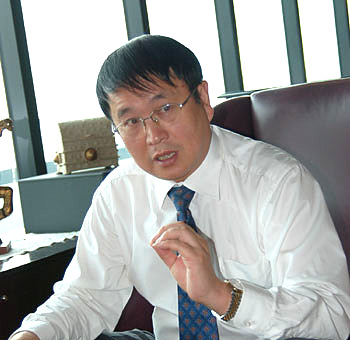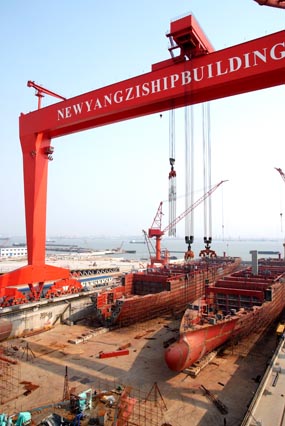 Ren Yuanlin lives in a home which is the size of two HDB executive flats. Photo by Sim Kih.BEING top businessmen with businesses in each other’s countries, Mr Ren Yuanlin of Yangzijiang Shipbuilding and Mr Sam Goi, chairman of Tee Yih Jia in Singapore, are no strangers to each other.
Ren Yuanlin lives in a home which is the size of two HDB executive flats. Photo by Sim Kih.BEING top businessmen with businesses in each other’s countries, Mr Ren Yuanlin of Yangzijiang Shipbuilding and Mr Sam Goi, chairman of Tee Yih Jia in Singapore, are no strangers to each other.
Mr Ren once visited the home of Mr Goi, well known as the popiah king, and was overawed by its grandeur and size. I know: I too have seen its swimming pool, basement carpark with a fleet of luxury cars, and a basement wine cellar.
When Mr Ren recalled his own visit to Mr Goi’s home in Tanglin, I asked him what his own home was like.
Relaxed in a couch on the 64th floor of the Tower Club, Mr Ren chuckled and replied: “I don’t need a big house. I have just moved to a new home.”
Instantly a picture of a mansion began to form in my mind only for it to be sharply diminished in the next moment.
“Its built-up area is 2,500 sq ft. I consider it big enough,” said Mr Ren, 54. That is the floor space of approximately two HDB executive flats.
Is it a landed property? “Yes. Two storeys.”
He paid RMB 1.2 million for the property. He previously lived in an apartment provided by the company.
He lives with his home-maker wife and their 26-year-old son, who completed a master’s degree course in Britain two years ago and now works as a supervisor in a production line in Yangzijiang.

The man whom Forbes magazine last year ranked No. 60 among China’s richest lives in a neighbourhood that is none too exclusive. It is within 10 minutes drive from his shipyard, which is located near a small city, Jiangyin, which has a population of about 1.2 million.
Ms Kang Wan Chern, a Singapore business journalist, recently visited the yard which is about three hours by car from Shanghai.
“I interviewed him in his old shipyard. His office was spartan. The furniture – there were rattan ones – and the cushion covers – everything looked old. There was nothing luxurious about his office,” said Ms Kang. “He struck me as being thrifty.”
Canteen lunch with workers
At our Tower Club interview, Mr Ren put it this way: “I’m a bit different from those who made money quickly and who would splurge on luxury. I don’t really spend much. My lifestyle has not changed much over the years, except that I feel more work pressure.”
He added: “At work, I have lunch at the canteen with my workers. But at night, I may go out for dinner with clients.”
He has sampled a wide variety of Singapore food on business trips here over many years and his favourites are soya bean, Hainanese chicken rice and bak kut teh. “I like to eat where the ordinary people go to – the hawker centers, the food courts….”
He grew up among ordinary folks. He saw his family’s assets seized by the Communist government that took over China. His father once owned a factory producing umbrellas.
At the age of 19, he was assigned a menial job in state-owned Jiangyin Shipbuilding Factory, which was building wooden barges. “My ambition at that time was to become a carpenter,” he remembered with a smile.
But he proved to be more capable than that. He was given the opportunity to study naval design, and he rose to head various departments. He achieved a diploma in economics. By 1997, he was chairman of the board of directors of Jiangsu Yangzijiang Shipbuilding Factory, the predecessor of Yangzijiang.
What soon followed, in 1999, was a management-cum-staff buyout of the company from the state. The initial purchase was RMB 20 million, of which Mr Ren contributed over 4 per cent.
As the capital injection rose to RMB 80 million, the yard’s new shareholders included external investors and more than 1,000 of the shipyard’s workers, some of whom contributed RMB 10,000 each.
When the allotted time for the interview was up, details were still hazy about the total amount that Mr Ren had sunk into Yangzijiang. Much about the rest of his life was none too clear either.
Stayed at Hotel 81 in Chinatown
I sent follow-up emails to Ms Liu Hua, 33, the company’s chief financial officer who joined Yangzijiang about a year ago. I also made a phone call to her, asking for any past media articles on Mr Ren. There was none that she knew of, she said, explaining: “He has been a low profile person. You may be the first to ask so much about his personal life.”

She said that her boss flies economy and stays in hotels such as Hotel 81 in Chinatown. This shocked the bosses of a Singapore company that he had traveled to meet for discussion.
But didn’t Mr Ren stay in the Fullerton Hotel on his latest visit, I asked? She said that he did but it was insisted on by a friend as a treat since Mr Ren would never pay for luxury.
Mr Ren, she continued, would not use his own China mobile phone for calls when in Singapore to local numbers but would use hers – to save on phone charges as her phone is under a Singapore telco. (Ms Liu is based in Singapore)
She knew of an ocassion when someone called Mr Ren's mobile phone in China, and he immediately told the caller: “I’m at home now, please call my home line.”
If he is tight-fisted about spending, he can be very generous too. The company donated one of the highest amounts - RMB 10.3 million - to victims of the Sichuan earthquake in May 2008.
Mr Ren currently holds a 29 per cent stake in the company, which translates into a market value of about $450 million based on Yangzijiang’s market value hovering at around $1.5 billion at the time of writing.
He surely can afford to relax a bit with, say, regular games of golf, except he has no interest in it. In fact, he has never played golf, and has no interest outside of work, he said. He surely can also afford a mansion or two on the scale of Mr Goi’s but that too is beyond his realm of priorities.
This article is reproduced from Pulses magazine with permission.





